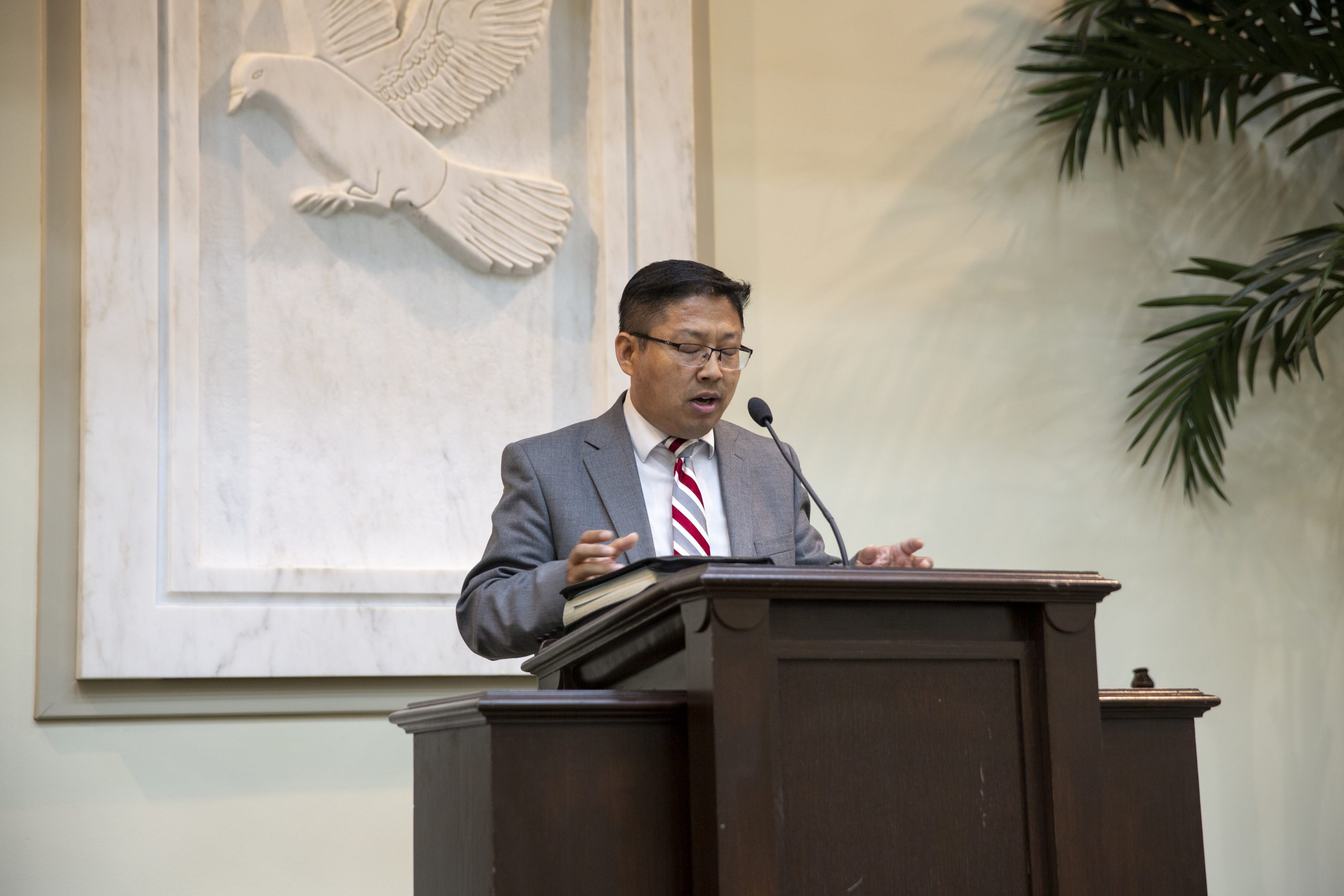亲爱的朋友,欢迎您浏览我们的网站。
“城造在山上,是不能隐藏的”(马太福音5:14下)。我们祈祷,求主使用小石城以马内利华语浸信会,使“这座造在山上的城”能“如日头出现、光辉烈烈”(士师记5:31),在新时代中为主发大光,照亮周围的人,使荣耀归于上帝。
我们诚挚地邀请您来参加我们教会的各项活动!让我们一同认识主,在祂的愛里彼此搀扶,共走天路。以马内利!
 李春海牧师
李春海牧师
最新信息
1/5/25 牧者之言
1/5/25 牧者之言
“喜乐事奉”:同工们的分享
诗100: 2 你们当乐意事奉耶和华。 保罗说:“就如身子是一个,却有许多肢体;而且肢体虽多,仍是一个身子;基督也是这样”(林前12:12)。上周日(12-29-2024)是同工分享日,我们教会有10位同工热情洋溢地分享了教会各项事工的进展及代祷需要。 承慧讲到:“主的话是我脚前的灯,是我路上的光”(诗119:105)。教会周日主日学查考《使徒行传》,周五晚查考《出埃及记》,新旧约共同学习相得益彰、光中见光。“路灯读经微信小组”每日打卡读经,弟兄姐妹互相监督、共同长进。每周三晚6点的“赞美操”既可敬拜主,又可操练身体。 魏师母概括儿童事工时提到,王艺颖是儿童事工联络人,王雪、魏师母、莎莎师母是老师。她强调这项服侍值得投入时间和精力。她特别祝贺小朋友们圣诞演出成功!2025年我们需要为更多人加入服侍,以及暑期圣经学校(VBS)祷告。她挑战说,“上帝是否呼唤你担任VBS联络人?弟兄或姐妹都可以。上帝是否呼唤你今年在 VBS 服侍?上帝是否呼召你教导儿童主日?你可以直接问上帝。不要害怕或觉得自己没有资格以这种方式参与教会服侍。上帝呼唤谁……他就有资格!你将获得巨大的祝福,你也将成为祝福!” 宏岚总结食物组的服侍:教会每年6-7次大型聚会,每次弟兄姐妹踊跃带美食来,使大家有丰盛的宴席。青少年们积极服侍,家长教导有方。同时,每周日弟兄姐妹轮流带茶点,如有人不在名单里而愿意参与者,可以告诉她。2025年马上来临的中国农历新年和复活节,大家若有好的建议欢迎提出来。 张琨分享教会晨祷和举牌事工。对于晨祷会他说:“曾经的晨祷会也逐渐变成了中美合一祷告会,众弟兄姐妹一起从清晨到晚上,将我们的忧虑交托给主,口也被神打开,可以说出赞美神的话。在为肢体的代求中,我自己渐渐体会到了别人的痛苦和挣扎,也体会到了代祷蒙应允后与肢体一起体会到的喜乐和平安。个人主义当道的今天,这一点点的信徒之间的相同(圣徒相通)带来的喜悦显得尤为宝贵”。对于举牌,他说:“圣诞前教会在华人超市门口进行了3次为主举牌传福音活动,大人孩子一起,给陌生人讲解福音,为他们祷告。出乎意料,神赐给了一些孩子们特别的勇气和爱心,追着陌生人发礼物,给他们讲福音,使大人蒙激励。神可以使不愿出头的华人把脸舍去为主举牌,神一样可以引领处在属灵低谷中的信徒重新抬起头来仰望为我们信心创始成终的耶稣基督。求主带领我们在新的一年里能有更多举牌服侍”。另外,他祈祷盼望能有更多人兴起爱主,教会能安排更多领主餐,使众肢体藉主餐礼更深对付罪、更多经历十字架救恩。他引用潘霍华的话结束:“廉价恩典是教会致命的仇敌。今日我们得为昂贵的恩典而战。廉价恩典像把恩典拿到旧货摊上贱卖。廉价恩典就是传扬不须悔改的饶恕之道,传讲不须遵守教会纪律的受浸之道,传讲不须认罪的擘饼仪式,传讲不须个人忏悔的赦罪之道。廉价恩典就是不须要作门徒的恩典,是缺了十字架的恩典,是没有复活和道成肉身的耶稣基督之恩典。” 磊宏在分享青少年事工时提醒大家:1. 家长不能只是孩子的朋友,而是主安排的带领者,他们有责任带领孩子走神的道路。2. 同工和家长要保持沟通。家长不是只把孩子托付给他人,而是要与同工配合,一同做主工。3.多鼓励孩子们参与教会活动和事奉。 财务方面,史保罗(Paul Spann)代表教会感谢每位家人通过教会奉献给主的每一分钱。奉献是敬拜的行动。在过去一年里,尽管有一个月出现赤字,但圣诞月奉献很好。关于有人提出建堂基金的问题,他解释到:教会有建堂基金。教会普通收入的所有结余都将归于建堂基金。若弟兄姐妹在十一奉献之外有感动作建堂奉献,欢迎在支票备注或信封左下角处注明:“Building Fund”。 魏牧师说:“希伯来书告诉我们,不可停止聚会,祷告和团契。我们每日清晨在Zoom上见面,但我们千万不要忘记周三晚上祷告会,我们可以面对面分享代祷需要,彼此祷告。当我们一同祷告时,我们在基督里真正成为弟兄姐妹。祷告是教会合一的关键”。他特别要感谢教会为Sweetie姐妹的代祷和奉献支持,感谢上帝已为Sweetie预备了助教工作,使她可以明年顺利毕业,荣耀归主名! 12岁的吴天柔小姐妹说:“我最喜欢的经文是约翰福音3:16节。当我第一次在教会司琴时,我心里非常兴奋。心想,我终于可以在教会司琴了。在轮到我第2和第3次司琴时,我心里想,怎么又轮到我弹琴了。但当我想到上帝为了爱我们,将他的独生儿子都为我们舍弃了生命时,我就甘心乐意地服侍主了”。 慕道班/基础班是由Vivian和凌雯带领。Vivian说:“这个班介绍信仰基本要道,学习基本专题,包括:神(三位一体)、耶穌、圣灵、人、罪、救恩、圣经、教会,为信仰打好基础”。她请大家祷告有更多慕道友愿意来学习, 求圣灵帮助她们的带领, 也求圣灵挪开慕道友的一切的拦阻、使他们早日决志接受耶穌为救主和生命的主。同时,她感谢帶領崇拜的领詩和献詩的弟兄姐妹。她鼓励弟兄姐妹:“务要坚固, 不可摇动, 常常竭力多做主工, 因为知道你们的劳苦在主里面不是徒然的”(林前15:58)。 最后,子钧分享学生学者团契,尽管这个团契的人数不太多,但主却看为宝贵,因为“若有人服侍主,主就必尊重他”。他希望新的一年里能有更多人参加,并愿意在事奉上更加竭力。 此外,还有许多事工没有提到,比如每周主日教会提供同步英文翻译,耳机设备等。“麻雀虽小,五脏俱全”。感谢主赐福教会,感谢主兴起那么多同工一同服侍,求主兴起更多同工服侍。愿在新的一年里,教会不是依靠势力、不是依靠才能,乃是依靠神的灵方能成就大事!以基督之名,阿门!1/5/25 Pastor’s Word
“Joyful Serving:” Sharing from Co-workers
Psalm 100: 2 Worship/Serve the Lord with Gladness. Paul said, “For just as a body is one and has many members, and all its parts, though many, are one body, so also is Christ” (1 Cor 12:12). Last Sunday (12-29-2024) was our Co-worker’s Sharing Day, and 10 co-workers from our church enthusiastically shared the progress of various ministries in the church and the need for prayer. Chenghui said: “The word of the Lord is a lamp to my feet and a light to my path” (Ps 119:105). The church is studying the Acts of the Apostles on Sundays and Exodus on Friday evenings. The New and Old Testaments complement each other and light shines in the light. The “Street Light Bible Reading WeChat Group” checks in every day to read the Bible, and brothers and sisters supervise each other and grow together. The “Praise Exercise” at 6 pm every Wednesday night can both worship the Lord and exercise the body. When summarizing the children’s ministry, Mrs. Elinda West mentioned that Wang Yiying is the children’s coordinator, and Wang Xue, herself, ad Mrs. Shasha Li are teachers. She emphasized that this service is worth investing time and energy in. She especially congratulated the children on their successful Christmas performance! In 2025, we need to pray for more people to join the service and the Summer Bible School (VBS). She challenged, “Has God called you to serve as a VBS coordinator? Either a brother or a sister can do it. Has God called you to serve in VBS this year? Has God called you to teach children on Sunday? You can ask God directly. Don’t be afraid or feel that you are not qualified to participate in church service in this way. Whoever God calls… He is qualified! You will receive a huge blessing, and you will be a blessing!” Honglan summarized the service of the food committee: The church held 6-7 large gatherings every year. Every time, brothers and sisters brought delicious food, so that everyone could have a rich feast. The young people actively serve, and the parents teach them well. At the same time, brothers and sisters take turns to bring refreshments every Sunday. If someone is not on the list and is willing to participate, you can tell her. In 2025, the Chinese Lunar New Year and Easter are coming soon. If you have any good suggestions, please feel free to let her know. Zhang Kun shared the church’s morning prayer and sign-holding ministry. Regarding the morning prayer meeting, he said: “The morning prayer meeting has gradually become a China-US United Prayer Meeting. Brothers and sisters come together from early morning to night, entrusting our worries to the Lord, and our mouths are opened by God to speak words of praise. In interceding for the members, I gradually experienced the pain and struggle of others, and also experienced the joy and peace that I experienced with the members after my prayers were answered. In today’s world where individualism is prevalent, the joy brought by this little bit of similarity between believers (the communion of saints) is particularly precious.” Regarding holding signs, he said: “Before Christmas, the church held three sign-holding evangelism activities in front of the Chinese supermarket. Adults and children explained the gospel to strangers and prayed for them. Unexpectedly, God gave some children special courage and love. They chased strangers to give gifts and shared the gospel to them, which encouraged the adults. God can make the Chinese who are reluctant to stand up put down their faces and hold signs for the Lord. God can also lead believers who are in a spiritual trough to raise their heads and look up to Jesus Christ, the author and finisher of our faith. May the Lord lead us to have more sign-holding services in the new year.” In addition, he prayed that more people would be raised up to love the Lord, and the church could arrange more Lord’s Suppers so that all members could deal with sin more deeply and experience more of the salvation of the cross through the Lord’s Supper. He concluded by quoting Bonhoeffer: “Cheap grace is the deadly enemy of our church. We are fighting today for costly grace. Cheap grace means grace sold on the market like the cheap jackwares. Cheap grace is the preaching of forgiveness without requiring repentance, baptism without church discipline, Communion without confession, absolution without personal confession. Cheap grace is grace without discipleship, grace without the cross, grace without Jesus Christ, living and incarnate.” Leihong reminded everyone when sharing about youth ministry: 1. Parents cannot just be a friend to their child, but leaders arranged by the Lord. They have the responsibility to lead their children on the path of God. 2. Co-workers and parents should maintain communication. Parents should not just entrust their children to others but cooperate with co-workers to do the Lord’s work together. 3. Encourage children to participate in more church activities and services. In terms of finance, Paul Spann thanked everyone for every penny they gave to the Lord through the church. Giving is an act of worship. In the past year, although there was a deficit in one month, the Christmas month giving was very good. Regarding the question of the building fund, he explained: The church has a building fund. All surpluses from the church’s general offering will go to the building fund. If brothers and sisters are moved to give to the building fund in addition to their tithe, please write “Building Fund” on the check memo or in the lower left corner of the envelope. Pastor Ron said: “The book of Hebrews tells us we should not avoid meeting together for worship, prayer and fellowship. We are meeting together on Zoom in the mornings, but we must not forget our Wednesday night prayer meeting where we can meet face to face to share prayer needs and answers to prayers. As we pray together, we become true brothers and sisters in Christ. Prayer is the key to unity in the church.” He especially wanted to thank the church for our prayers and support for Sister Sweetie and thank God for having prepared teaching assistant job for Sweetie so that she will be expected to graduate successfully next year, glory to the Lord! 12-year-old sister Tina said: “My favorite scripture is John 3:16. When I played the organ for the first time in the church, I was very excited. I thought to myself, I can finally play the organ in the church. When it was my turn to play the organ for the second and third time, I thought to myself, why is it my turn to play the piano again? But when I think about how God loves us so much that he gave up his only Son for us, I am willing to serve the Lord.” The Seekers/Basic Class is led by Vivian and Ling Wen. Vivian said: “This class introduces the basic doctrines of faith and learns basic topics, such as: God (Trinity), Jesus, Holy Spirit, man, sin, salvation, the Bible, and the church, to lay a good foundation for faith.” She asked everyone to pray that more gospel seekers would be willing to learn, and asked the Holy Spirit to help them teach, and also ask the Holy Spirit to remove all obstacles from the seekers, so that they can decide to accept Jesus as their Savior and Lord of life soon. At the same time, she thanked the brothers and sisters who led the worship and sang offertory songs. She encouraged the brothers and sisters: “Be steadfast, immovable, always striving to do more in the work of the Lord, because you know that your labor in the Lord is not in vain” (1 Cor 15:58). Finally, Zijun shared about the student and scholar fellowship. Although the number of people in this fellowship is not large, the Lord considers it precious because “if anyone serves the Lord, the Lord will honor him.” He hopes that more people will participate in the new year, and he is willing to work harder in serving. In addition, there are many ministries that have not been mentioned, such as the provision of simultaneous English translation and headphone equipment every Sunday. “Although the sparrow is small, it has all the necessary organs.” Thank the Lord for blessing the church, thank the Lord for raising so many co-workers to serve together, and pray that the Lord will raise up more co-workers. In the new year, may the church not rely on power or talent but rely on the Spirit of God to accomplish great things! In the name of Christ, Amen!2025 全年主题:耶稣基督并他钉十字架
2025 全年主题:耶稣基督并他钉十字架
2025 Theme: Jesus Christ and Him Crucified
林前(1 Cor ) 2:2 因为我曾定了主意,在你们中间不知道别的,只知道耶稣基督并他钉十字架。 2:2 For I resolved to know nothing while I was with you except Jesus Christ and him crucified.
一月宣讲《路得记》
主题:投靠在主的翅膀下Take Refuge under the Wings of the Lord
1/5 第一章 归回(Return)
1/12 第二章 拾取麦穗 (Pick up the Leftover Grain)
1/19 第三章 找到安身之处(Find a Home) (主餐礼)
1/26 第四章 赎买者Redeemer
2/2 你们必须重生 (约3: 1-21) (新年庆祝)
接着宣讲《士师记》中的士师们,从拯救者身上看到基督
2/9 俄陀聂 Othniel (1:13, 3:7-11 )
2/16以笏 Ehud (3: 12-30)
2/23底波拉 Deborah (4:-5:)
3/2基甸 Gideon (6:-8:)
3/9耶弗他 Jephthah (10:6-12:7)
3/16参孙(之一)Samson (I) (13:-16:)
3/23 参孙(之二)Samson (II) (13:-16:)
3/30 特别讲员
我们仰望天父的旌旗率领我们在新的一年中凡事得胜;愿我们的好牧人耶稣亲自在我们中间牧放群羊;求真理的圣灵带领牧者的预备和宣讲,能按时分粮给我们,使我们在生命上得到供应和喂养。主啊,我们愿意只知道耶稣基督并他钉十字架,我们愿意只见耶稣,不见一人。以基督之名,阿门!
同工分享日经文 (12/19/2024)
同工分享日经文
Scriptures for Co-workers Sharing Day
诗篇 (Psalm) 37: 1-6
1 Do not fret because of those who are evil or be envious of those who do wrong; 2 for like the grass they will soon wither, like green plants they will soon die away. 3 Trust in the Lord and do good; dwell in the land and enjoy safe pasture. 4 Take delight in the Lord, and he will give you the desires of your heart. 5 Commit your way to the Lord; trust in him and he will do this: 6 He will make your righteous reward shine like the dawn, your vindication like the noonday sun.
罗马书 (Romans) 12: 3-13
3 我凭着所赐我的恩,对你们各人说:不要看自己过于所当看的,
3 For by the grace given me I say to every one of you: Do not think of yourself more highly than you ought, but rather think of yourself with sober judgment, in accordance with the faith God has distributed to each of you. 4 For just as each of us has one body with many members, and these members do not all have the same function, 5 so in Christ we, though many, form one body, and each member belongs to all the others. 6 We have different gifts, according to the grace given to each of us. If your gift is prophesying, then prophesy in accordance with your faith; 7 if it is serving, then serve; if it is teaching, then teach; 8 if it is to encourage, then give encouragement; if it is giving, then give generously; 9 Love must be sincere. Hate what is evil; cling to what is good. 10 Be devoted to one another in love. Honor one another above yourselves. 11 Never be lacking in zeal, but keep your spiritual fervor, serving the Lord. 12 Be joyful in hope, patient in affliction, faithful in prayer. 13 Share with the Lord’s people who are in need. Practice hospitality.
2024年12月22日 牧者之言
“从婴孩儿的口中……”
我需要告诉你,我是一个从不骂人的人……等一下,
还记得几年前我们去银行的时候吗?对我来说,那是 28 年前的事了;他们过去常常给你那些五颜六色的水果味棒棒糖,
在我下一个银行日,那位女士果然给了我 2 个送给泰勒的棒棒糖。我回到家后,把它们给了泰勒,
这个故事的寓意是,不要说任何你不想从你宝贵的小“宝贝”嘴里听
今年圣诞节我们会为你们每个人祈祷。祝你们圣诞快乐……
大卫、桑迪和雷特
“污秽的言语,一句都不可出口,只要随事说造就人的好话,
(弗 4:29)
I need to tell you that I am a person that never curses…..now wait a minute, no offense to anyone that does. I was raised by a Mom that never said any slang or curse words. She would say, “Ladies do not say those kinds of words… especially little ladies.” So, I didn’t. This is where it gets interesting & a little bit funny. After I left home, & got married, I picked up a word that I know my Mom didn’t approve of, but it became my “go to slang word.” Here it is… “Crap!” Not very lady like but, I said it anyway, when the “word” fit the situation. Tay’s mom, Aimee asked me to stop using that word around Tay, she was picking it up & the next time she says it, Aimee said, “I will spank her” (those were the days that you could actually spank your child without anyone accusing you of being a bad parent). I told her I would not say that word again. I did not want Tay to get a spanking because of me & my unwise choice of the word, “Crap.”
Do you remember back when we went to the bank, years ago, for me it would have been 28 years ago; they used to give you those multi-colored fruit flavored suckers with the looped soft, twisted strings on them. The lady at the bank knew I had a 2-year-old granddaughter, & she used to give me 2 suckers every time I went through the drive thru. I always gave them to Tayler Morgan when I went home, & she loved banking days!
On my next banking day, sure enough the lady gave me 2 suckers for Tayler Morgan. When I got home, I gave them to Tay & then I left the room to make some dinner. Aimee was in the back of the house. I came back into the living room & there were the sucker strings & wrappers torn up & tossed on the living room floor. I said, “Tayler Morgan, what is that!?” She looked at me with her sweet little face & said, “Looks like Crap to me, Grammy.” Then I heard Aimee’s voice from down the hallway saying, “What did she say?!” I said, “Oh, nothing, she didn’t say anything,” as I was scrambling to pick up the mess in the floor & hide it quickly in the trash.
The moral of this story is, don’t say any words that you would not want to hear coming out of the mouths of your precious little “babes.”
We will be praying for each of you this Christmas. Have a very Merry Christmas…..and watch what you say around your little ones, or you could end up on Santa’s naughty list!
Ephesians 4:29
“Let no corrupt communication proceed out of your mouth,
but that which is good to the use of edifying,
历史归档
- December 2025 (1)
- November 2025 (5)
- October 2025 (4)
- September 2025 (4)
- August 2025 (4)
- July 2025 (4)
- June 2025 (4)
- May 2025 (5)
- April 2025 (5)
- March 2025 (5)
- February 2025 (4)
- January 2025 (4)
- December 2024 (5)
- November 2024 (5)
- October 2024 (4)
- September 2024 (4)
- August 2024 (5)
- July 2024 (4)
- June 2024 (5)
- May 2024 (4)
- April 2024 (4)
- March 2024 (7)
- February 2024 (5)
- January 2024 (4)
- December 2023 (8)
- November 2023 (10)
- October 2023 (6)
- September 2023 (4)
- August 2023 (5)
- July 2023 (6)
- June 2023 (6)
- May 2023 (4)
- April 2023 (13)
- March 2023 (4)
- February 2023 (4)
- January 2023 (7)
- December 2022 (14)
- November 2022 (4)
- October 2022 (2)
- September 2022 (8)
- August 2022 (5)
- July 2022 (6)
- June 2022 (7)
- May 2022 (5)
- April 2022 (12)
- March 2022 (6)
- February 2022 (5)
- January 2022 (8)
- December 2021 (8)
- November 2021 (4)
- October 2021 (3)
- January 2019 (1)





